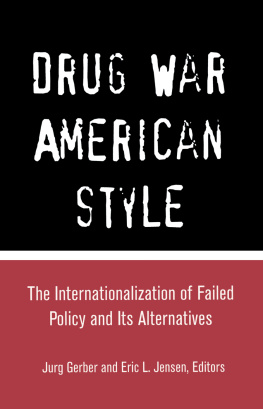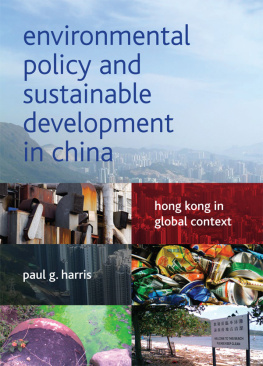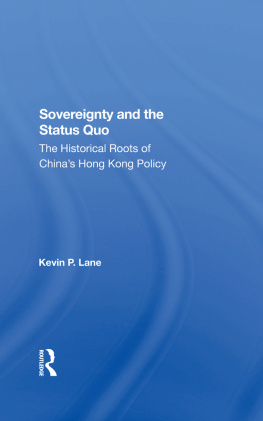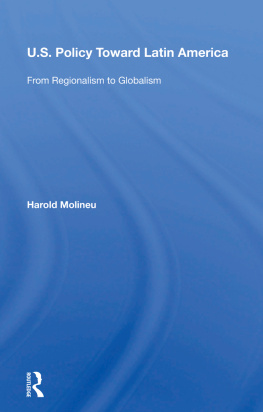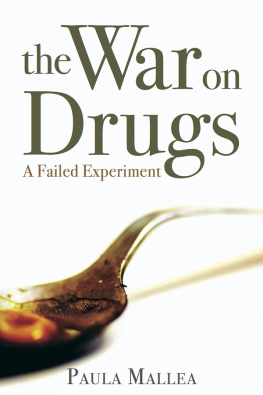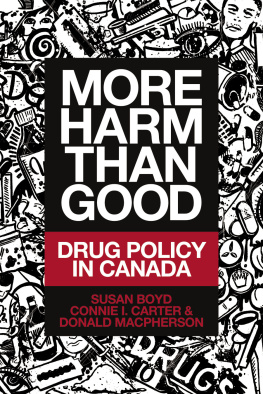DRUG WAR, AMERICAN STYLE
DRUG WAR, AMERICAN STYLE
THE INTERNATIONALIZATION OF FAILED POLICY AND ITS ALTERNATIVES
EDITED BY
JURG GERBER AND ERIC L. JENSEN
First published 2001 by Garland Publishing
Published 2013 by Routledge
2 Park Square, Milton Park, Abingdon, Oxon OX14 4RN
711 Third Avenue, New York, NY, 10017, USA
Routledge is an imprint of the Taylor & Francis Group, an informa business
Copyright 2001 by Jurg Gerber and Eric L. Jensen
All rights reserved. No part of this book may be reprinted or reproduced or utilized in any form or by any electronic, mechanical, or other means, now known or hereafter invented, including photocopying and recording, or in any information storage or retrieval system, without permission in writing from the publisher.
Library of Congress Cataloging-in-Publication Data is available from the Library of Congress.
Drug war, American style : the internationalization of failed policy and its alternatives / edited by Jurg Gerber and Eric L. Jensen.
Includes bibliography and index.
ISBN 13: 978-0-815-33405-7 (hbk)
Between the time Website information is gathered and the date of publication, individual sites may have moved or may no longer be active. Therefore, the publisher cannot guarantee that the Websites listed herein are still accessible at the URL provided.
Contents
Jurg Gerber and Eric L. Jensen |
Kevin F. Ryan |
Hans-Jrg Albrecht |
Mark S. Gaylord |
Philip Bean |
Margaret Hamilton |
Patricia G. Erickson and David L. Haans |
Furjen Denq and Hsiao-Ming Wang |
Eugene E. Bouley Jr. |
Ineke Haen Marshall and Henk van de Bunt |
Hans-Jrg Albrecht |
Martin Killias |
It has often been said that many people contribute to the successful publication of a book. A few of these individuals receive credit by having their names published on the cover or with their chapters. Most of the others receive little recognition. Without their contributions, however, few books would ever see the light of day. It is these individuals we would like to thank first. Frank Trey P. Williams III and Marilyn D. McShane, the former general editors of Current Issues in Criminal Justice, deserve our thanks. It was Trey who encouraged us early on and shepherded the book through its early stages. Without his help, the book might not have been initiated. Pat Erickson not only is the senior author of the chapter on Canada, but also contributed in numerous other ways. She was an excellent sounding board for us and also suggested some of the contributors to the book. Pat, thank you for your support and assistance.
There are some people at Sam Houston State University we wish to thank. Dick Ward, dean of the College of Criminal Justice, provided financial support for the hiring of a copy editor, Cynthia Milne. Karen Jeffries, Michelle Moran, and Ruby Kennedy retyped Cynthias editing. With the help of all these people, we were hard-pressed to observe deadlines. Without their help, we would not have come even close.
Finally, as is always the case with an anthology, a special thanks goes to the contributors of the chapters. All our authors are exceptionally busy scholars who juggle competing demands. With few exceptions, they put this book near the top of their priorities. The result has been pleasurable collaboration, rather than hounding and pleading, as so many book editors must do. Thank you all for your diligence and support. We look forward to working with you in the future again.
The Internationalization of U.S. Policy on Illicit Drug Control
JURG GERBER
ERIC L. JENSEN
The United States has waged periodic wars on drugs for most of its existence. During the late 19th century, an antiopiate campaign was initiated that targeted Chinese immigrants in general, and Chinese railroad workers in particular. The 20th century witnessed the criminalization of marijuana and the concomitant persecution of Mexican and other Hispanic immigrants (and to a lesser extent African Americans) in the Southwest. This effort, in turn, was followed by a revival of the criminalization of narcotics, a war on drugs during the Nixon administration, and eventually the most recent assault, the continuing 1986 war on drugs. This last war targeted cocaine, crack in particular, and was thus focused to a large extent on blacks in the United States (Jensen & Gerber, 1998).
Even such a cursory overview of the wars on drugs shows at least two facts: (1) that they are fairly regular and consistent in occurrence and (2) that they often, if not always, have a relatively powerless target population. However, there is a third commonality that is central to our argument: These wars are socially constructed. They do not occur in a political, social, and media vacuum. Nor do they occur as a result of objective conditions surrounding drug use and abuse. Instead, people with vested interests in such wars make claims about the existence of certain conditions. Objective realities are of relatively little importance, although there is often a kernel of truth involved in this claims-making process (Reinarman, 1994). The claims, if repeated often enough, by sufficiently powerful people, take on a life of their own. The claims themselves become the justification for the wars. We, among others, have analyzed this issue with respect to the 1986 war on drugs in the United States (Jensen & Gerber, 1998; Jensen et al., 1991; Reinarman & Levine, 1989).
The focus of this book is how this war has spread to other countries. It is no longer confined to the United States. In particular, the book aims to show how American claims-makers have tried, in many instances with success, to influence the domestic drug policies of other nations. It will show how international treaties have been shaped by American interests. At the same time, the book will show that cultural diffusion has played a role in this process, independent of any claims making. Finally, there are also legitimate international and cross-national issues involved in the control of illicit drugs. Some international cooperation is therefore both logical and to be expected.
OBJECTIVE CONDITIONS VERSUS SUBJECTIVE INTERPRETATIONS OF CONDITIONS
There is a long-standing debate surrounding the existence of problematic social conditions that focuses on their objective reality. One camp of social scientists maintains that social problems are objectively real, their existence can be empirically verified and measured, and solutions to these problems can be formulated and implemented. The other camp maintains that the empirical existence of problematic conditions is neither certain nor particularly relevant. Situations come to be seen and defined as social problems if interested parties make claims about these conditions and counterclaims are either not raised or not effective. Child abuse is a case in point. The objective reality of parents physically abusing their children is ancient, but this situation did not become a social problem until it was defined as such by interested parties. The condition itself was not sufficient; it also required a social claims-making process (Pfohl, 1977).
The chapters in this book have been influenced by the social construction perspective. We maintain elsewhere (Jensen & Gerber, 1998; Jensen et al., 1991) that the 1986 war on drugs in the United States cannot be understood on the basis of objective conditions surrounding illicit drug use and abuse. Self-reported drug consumption had either leveled off during the early 1980s or, in many instances, had crested in the late 1970s and had been steadily decreasing for five to ten years before the declaration of a war. Exceptions to this general trend were the use of powder cocaine among certain young adults and the introduction of crack to the American drug scene. These changes in the illegal markets did not justify the claims for a new crisis in drug consumption (see Jensen et al., 1991). Nevertheless, a process of claims making was initiated in which illicit drugs came to be seen as a condition that would justify drastic changes in the criminal justice process: The social constructionist perspective on social problems attempts to describe and explain how new definitions of social problems emerge, how troublesome persons or social arrangements are identified, how institutions are created to deal with them. It is attempting to explain how society,

